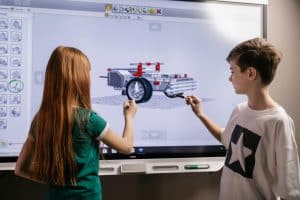
In today’s digital age, technology has become an integral part of our daily lives, and its presence in schools is rapidly growing. The integration of technology in education not only enhances the learning experience but also plays a crucial role in preparing students for their future professional careers. Let’s explore how technology in schools is shaping students’ future professional paths:
1. Digital Literacy
One of the most significant impacts of technology in schools is the development of digital literacy among students. Digital literacy refers to the ability to use, understand, and evaluate digital technologies effectively. By incorporating technology into the curriculum, schools are helping students develop the skills necessary to thrive in a technology-driven world.
2. Critical Thinking and Problem-Solving Skills
Technology in schools encourages students to think critically and solve complex problems. Through activities that require them to research, analyze information, and collaborate with peers, students develop essential skills that are highly valued in the professional world.
3. Collaboration and Communication
Technology facilitates collaboration and communication among students, teachers, and experts from around the world. Through online platforms, students can work together on projects, share ideas, and communicate with others, helping them develop teamwork and communication skills that are vital in any professional setting.
4. Access to Information and Resources
Technology provides students with access to a vast amount of information and resources that can enhance their learning experience. With the internet at their fingertips, students can explore new topics, conduct research, and access educational materials that can enrich their education and prepare them for future career opportunities.
5. Preparation for the Future Workplace
The use of technology in schools prepares students for the future workplace, where digital skills are increasingly in demand. By familiarizing students with technology early on, schools are equipping them with the skills and knowledge they need to succeed in a variety of professional fields.
6. Adaptability and Flexibility
Technology in schools teaches students to be adaptable and flexible in their approach to learning and problem-solving. As technology continues to evolve, students who are comfortable with technology will be better prepared to adapt to new technologies and navigate the ever-changing professional landscape.
7. Creativity and Innovation
Technology in schools encourages creativity and innovation among students. By providing them with tools and platforms to express their ideas creatively, schools are fostering an environment where students can develop the skills necessary to innovate and think outside the box in their future careers.
In conclusion, technology in schools is playing a vital role in shaping students’ future professional careers. By developing digital literacy, critical thinking, collaboration, and communication skills, technology is preparing students to succeed in a technology-driven world. As technology continues to advance, schools must continue to integrate it into their curriculum to ensure that students are prepared for the challenges and opportunities of the future workplace.
